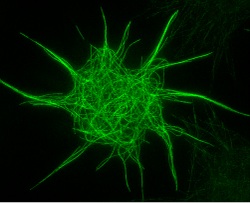
For the first time, Northwestern Medicine® scientists have discovered how kinesin-1, a major motor that drives transport of cellular cargo through the cell, requires the regulatory-protein ensconsin to function.
The research, published in Current Biology by Vladimir Gelfand, PhD, professor in cell and molecular biology, graduate student Kari Barlan, and postdoctoral fellow Wen Lu, PhD, shows that ensconsin is required for the transport of cellular cargo in neurons and non-neuronal cells.
By analyzing the movement of cellular cargo in two types of cultured cells, the scientists determined that when cells were depleted of ensconsin, the movement of the cargo along microtubules, or the tracks for transport, was severely impaired. They also found that the depletion of ensconsin impaired the ability of the kinesin-1 motor to assist in the moving of microtubules against each other, also known as microtubule sliding.
“This is something that scientists have suspected is going on, but this is the first paper where it is actually shown,” said Gelfand.
In addition to showing the role of ensconsin in cell tissue function, Gelfand explored how it affects an entire organism by studying it in fruit flies. He found that flies without this protein do not survive into adulthood.
While the research focused on flies, the components described in the paper are present in all animals.
“Our research adds to the growing body of evidence suggesting that microtubules don’t just serve as passive tracks for motor proteins, but may actively participate in regulating transport,” he said.
Microtubule sliding has piqued Gelfand’s interest, and he plans to continue to study this mechanism. He hopes that learning how processes are carried out in neuronal cells could assist in developing treatments to neurological conditions.
“When we choose to study something and understand how it works, we are careful not to pick something that is only found in flies,” Gelfand said. “The components in this study are found in both fly and human cells, which make them important for the understanding of human diseases.”






